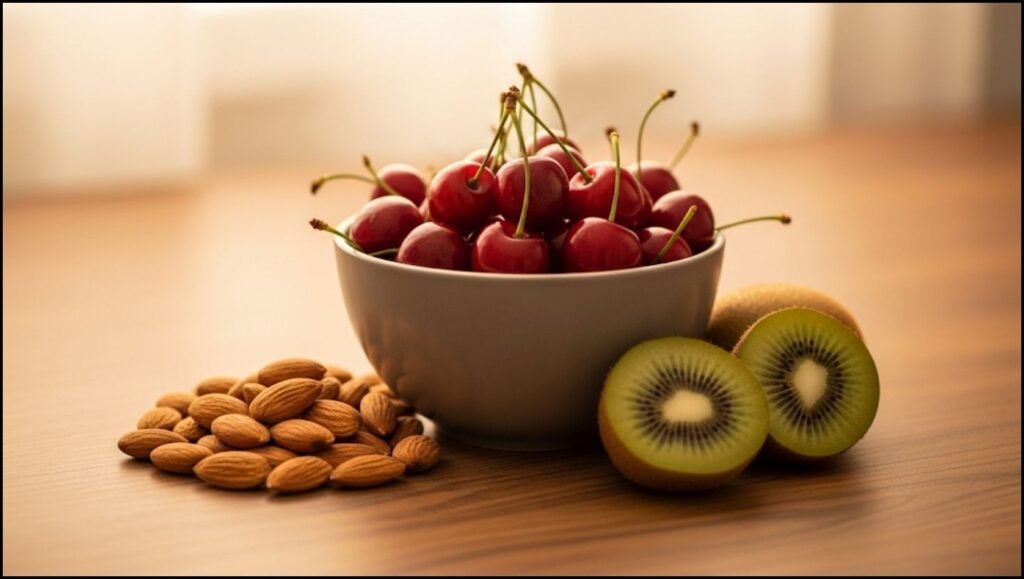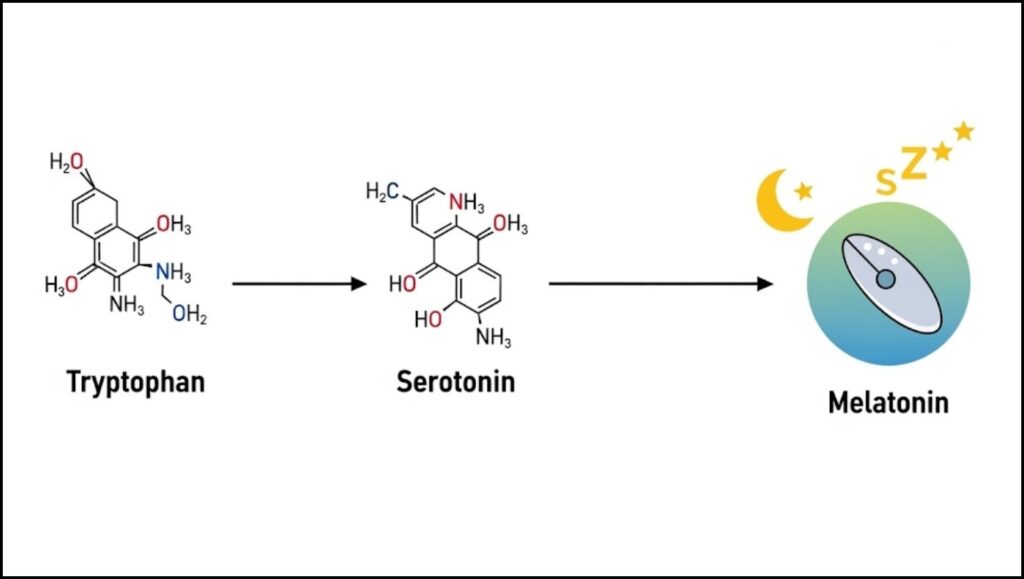An increasing body of scientific evidence suggests that specific dietary choices can significantly impact sleep quality. For individuals seeking to improve their rest, nutritionists are highlighting a handful of key foods for better sleep that contain compounds known to support the body’s natural sleep-wake cycle, offering a practical, science-backed approach to complementing healthy sleep habits.

Sleep-Promoting Foods
| Food Item | Key Sleep-Promoting Nutrient(s) | How It Supports Sleep |
| Tart Cherries | Melatonin | Directly boosts the body’s primary sleep-regulating hormone. |
| Nuts (Almonds, Walnuts) | Magnesium, Melatonin | Aids muscle relaxation and regulates the sleep-wake cycle. |
| Fatty Fish (Salmon, Tuna) | Vitamin D & Omega-3s | Support serotonin production, a precursor to melatonin. |
| Kiwifruit | Serotonin, Antioxidants | May improve sleep onset, duration, and efficiency. |
| Complex Carbohydrates | Tryptophan (availability) | Helps the amino acid tryptophan cross the blood-brain barrier. |
The Growing Link Between Diet and Sleep Quality
While factors like stress management and a consistent bedtime routine are well-established pillars of good sleep hygiene, the role of nutrition is gaining significant attention from the scientific community. The connection lies in specific micro and macronutrients that are either direct precursors to or cofactors in the production of sleep-regulating hormones and neurotransmitters.
“The food we eat provides the building blocks for everything our body does, and that includes sleeping,” explained Dr. Marie-Pierre St-Onge, an associate professor of nutritional medicine at Columbia University, in a statement to the university’s news service. The primary mechanism involves nutrients that influence melatonin, the hormone that governs the body’s circadian rhythm, or internal clock. Other compounds, like magnesium, play a role in calming the nervous system.
Experts emphasize that while no single food is a panacea for sleep disorders, incorporating certain nutrient-dense items can be an effective part of a broader strategy to improve rest. These foods for better sleep work by providing essential components the brain and body need to wind down and initiate a restful state.
A Nutritionist’s Top 5 Foods for Better Sleep
Based on peer-reviewed research and nutritional data, dietitians point to several specific foods that may help individuals fall asleep faster and stay asleep longer.
1. Tart Cherries
Tart cherries, particularly in juice form, are one of the few natural food sources of melatonin. A study published in the European Journal of Nutrition found that adults who drank tart cherry juice concentrate experienced increases in sleep time and sleep efficiency.
“The melatonin in tart cherries can directly supplement the body’s own production, which naturally rises in the evening to signal that it’s time to sleep,” said Sarah Miller, R.D.N., a registered dietitian nutritionist with the Cleveland Clinic. She advises consumers to look for 100% tart cherry juice without added sugars, which can have the opposite effect on sleep.
2. Nuts, Especially Almonds and Walnuts
Almonds are a significant source of magnesium, a mineral essential for over 300 biochemical reactions in the body. According to the National Institutes of Health (NIH), magnesium contributes to calming the nervous system by binding to gamma-aminobutyric acid (GABA) receptors, which helps quiet down nerve activity. A magnesium deficiency has been linked to troubled sleep and insomnia.
Walnuts offer another benefit: they are a notable source of the amino acid tryptophan, as well as providing their own source of melatonin. Tryptophan is converted in the brain to serotonin, a neurotransmitter that promotes relaxation, which is then converted into melatonin.

3. Fatty Fish
Fatty fish such as salmon, mackerel, and tuna are rich in two key sleep-promoting nutrients: vitamin D and omega 3 fatty acids. This combination is believed to support sleep by aiding the regulation of serotonin. A study in the Journal of Clinical Sleep Medicine found that men who consumed Atlantic salmon three times a week for several months reported better sleep quality and improved daytime functioning compared to a control group.
Researchers theorize that vitamin D and omega-3s work together to help the body produce and utilize serotonin more effectively, ultimately leading to more stable and restorative sleep patterns.
4. Kiwifruit
This small, fuzzy fruit has been the subject of several studies focused on sleep. One investigation from Taipei Medical University had participants consume two kiwis one hour before bedtime for four weeks. The results showed that participants fell asleep faster, slept longer, and experienced better overall sleep quality.
The benefits are often attributed to kiwi’s high concentration of serotonin and antioxidants, such as vitamin C. “The serotonin in kiwi could help shorten the time it takes to fall asleep, while the antioxidants may help reduce the oxidative stress associated with poor sleep,” notes a report from the Sleep Foundation, a leading health information organization.
5. Complex Carbohydrates
Consuming complex carbohydrates like oatmeal, quinoa, or whole-wheat toast a few hours before bed can also facilitate sleep. These foods trigger a mild insulin release, which helps clear other amino acids from the bloodstream, allowing tryptophan to more easily enter the brain.
“It’s about choosing the right kind of carbohydrate,” Miller cautioned. “A small bowl of oatmeal is an excellent choice, but a sugary cookie or bowl of ice cream can cause a blood sugar spike and subsequent crash, which can disrupt sleep patterns later in the night. This is a key piece of nutritionist advice.”
Timing and Overall Diet Remain Crucial
While these five foods can be beneficial, experts stress that consistency and timing are key. Consuming a large, heavy meal close to bedtime can cause indigestion and interfere with sleep, regardless of the food’s nutritional content. Most nutritionists suggest having a small, nutrient-focused snack about 60 to 90 minutes before bed if needed.
Ultimately, these foods for better sleep are most effective when integrated into a balanced and healthy overall diet. A diet chronically low in key vitamins and minerals or high in processed foods and sugar will likely undermine any benefits gained from a single sleep-promoting snack. A holistic approach that includes a healthy diet, regular exercise, and a consistent sleep schedule remains the most reliable path to better rest.
Why Princess Diana’s Breakfast Embodied a Modern Approach to Health
